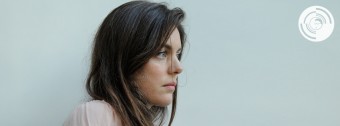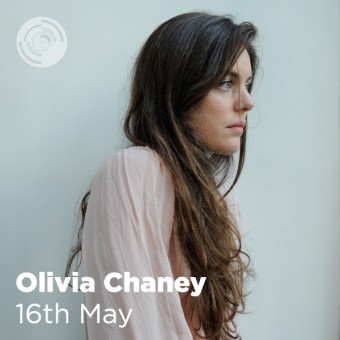English singer songwriter Olivia Chaney is taking the folk world by storm at the moment, with her blend of traditional and contemporary folk and classic pop songwriting, all apparent on her debut album ‘The Longest River’. Adorned with delicate piano and guitar, her songs demonstrate an understanding that many songwriters cannot achieve until they’re well into their career. We spoke to Olivia ahead of her show at Band on the Wall this month, to discuss songwriting and arrangement, her instrumental capabilities and her thoughts on all music in general.
The Longest River has seen high praise from both English and American press so far, is there a big distinction to be made between English and American folk music, or are many writing techniques and themes common to both?
I grew up listening to a healthy/heavy dose of both North American folk resurgence acts: the ‘60s ‘folk’ songwriters and the English equivalent (probably more the folk inspired songwriters and folk-rock bands than the pure-trad and the slightly more trad of Anne Briggs / The Young Tradition), a lot of the wonderful and creative hybrids of trad and original material bands such as Fairport Convention, Pentangle, a lot of Bert Jansch and on the other side of the Atlantic Bob Dylan, Joni Mitchell and Joan Baez.
A large, (obvious but downplayed in significance perhaps) distinction for me between the two is the accent or ‘voice’ material is sung in! I was chuffed to hear Will Hodgkinson the other day review my album by commenting that I sing in my ‘own voice’ and I’m not trying to sound trad as that certainly isn’t my only influence nor strict background. No one ever seems to comment on how many English singers sing/write with an American accent? In short, there is also of course much overlap in the original folk songs as it all came from the same place to start with the settlers, but where those songs that traveled over the water began to morph and change into their own style and then their own different cultural stories and experiences (and the songs often pining their old land), sometimes isolated regions in the States via particular regions from the British Isles, that’s where it often gets the most interesting or gritty, both sociologically and musically, which like so many worlds or pockets of music I love and have touched upon, is something I want to explore further. What I do know, is as I travel and tour a lot now in the States, I feel all the more conscious (and hopefully not self-conscious) about maintaining ‘my voice’ or way of singing/identity, whatever you want to call it, because it has taken me a life-time to find it, through many passions, harsh self-criticisim, a lot of thinking about and listening to, good pop, traditional folk, jazz, experimental and classical…and the rest!
You’ve included a rendition of a Violeta Parra song on the album, are you a fan of Nueva Cancion, or South American music broadly?
What I know of it yes! I was almost living under the kitchen table of old neighbours and dear friends, one of whom is Chilean and their music collection was perhaps vaster and broader than even then-music-student mine, but with a heavy emphasis on South American music, and a huge range within that, from dying indigenous tribal chants to heavy dance/fusion/pop. So I suppose that influence became a soundtrack for one of the many itinerant, breakup periods in my life. We were then working and performing together, performance art/art actions. I managed to injure my foot after (in a sense during) one particular performance on the Isle of Sheppey, leaping into the sea and was thus holed up further in their tiny kitchen beneath my old flat. They got a bit tired of me feeling stuck so they thrust a guitar into my hand (I already wanted to learn but was probably daunted from my classical training and harsh perfectionism) and finally I begun to learn that Violeta song – having been so utterly struck by her music from the moment I first heard her voice; something so painfully and beautifully raw about her songs, and to think I often didn’t understand the words (had to have them translated) and yet it’s impact was immediate, implicit, transcending language, which is why I’ve also chosen to continue singing it in her original language. I love singing in other languages even if I don’t speak it, it helps you climb inside the song and perhaps is another tangent from my point about accent. Singing in an accent might be imitation, singing in the original language is another thing. I’m not saying one is right or wrong, but I certainly love singing in the original languages, but in my own accent for English!
The strings on tracks like ‘Imperfections’ are very subtle, and they sound very crisp and dry. Did you write these arrangements, and did you have a clear idea of how you wanted them to sound?
Yes I had very particular, bordering on control-freakish ideas (as I most often do when it comes to my music and arrangements). I was helped with technical/ Sibelius-scoring assistance by the genius musician and composer Dave Maric (a Manchester associate being my old house parent from Chetham’s School of Music) so we’ve been making music together since I was 14. The process was my very particular ideas with some improvised moments and Dave kindly transcribing them or helping work out where they’d best sit for particular players. Jordan Hunt (a long-standing collaborator and an integral part of the album, from Oldham originally though sadly can’t be with me for this show) and I have, over years evolved our more intimate arrangements, and some of the string parts grew from them also, deliberately, hence crediting him and Dave! With regards the crisp, dry sound, I didn’t want anything too lush or Hollywood sounding. I had to fight a lot of people to keep things that dry. I LOVE the sound of RAK studios; it’s all wood and atmospheric and kind of heavy in there. It was just right for making that album and the players were beautiful, so I just wanted it to sound like you were standing in the room really. I’m very lucky, I’ve known musicians like Dave Maric and Jordan Hunt who, before I’ve sometimes even sung/played the idea in my head I’d like them to play, or some kind of Leit motif/ starting point, they’ve often already begun playing it in their own inimitable, beautiful way! I also add that the wonderful man and musician/Violist Vince Sipprell took his own life recently, so I’ll never forget that day of recording the strings for that record now all the more.
You’re a harmonium player among other instruments; it’s an instrument that has been used in folk, but also by artists like Nico on albums like Desertshore. Are you a fan of hers, and what first drew you to the instrument?
I love Nico, but she was not my introduction to the harmonium. It was via an extraordinary musician with Irish roots (now doing his Phd in Newcastle) called Matthew Ord . I’d been stood up on a date at a friends show at the Southbank so I probably rather wistfully joined the band for a meal after in a restaurant. In the background was this magical sound, and tunes it felt as if I’d been searching and failing to quite find that time, truly, I realised it was live and being made by an unassuming guy with his jacket on, hunched over his guitar in the corner. I bounded over and told him how beautiful I thought it was, he gave me a CD, we swapped emails and soon after he started coming round, teaching me songs and we’d nerd out on Irish folk. One day he turned up with a harmonium (I even was known to play Bazouki on a gig or too, badly). We’d sing duos and swap instruments and I started getting us gigs in local pubs (and dragging a lot of friends over, it was great fun). Musically this was huge for me too, after having been stuck learning all this new stuff on my own, feeling it was going nowhere, and suddenly here was someone to share it with and learn so much from. My then boyfriend eventually bought me my own harmonium, the one I still play and has now traveled around the world with me.
Which instrument did you begin playing, and which do you find are best to formulate ideas?
I begun playing piano by ear, then got a teacher, then cello (want to play harp but couldn’t afford Harp, the local council only had cellos left) and singing. Much later came guitar (and harmonium) that I taught myself after years of studying. With regards ideas, writing, arranging, feeling inspired; my ideal is to have a work space with all the instruments at hand (and more, I used to have a little harp and ankle bells and a knackered old synth and a borrowed wulrstizer, but living logistics and travel have meant I’ve had to simplify, scale down) and kind of jump between them even for one song. Piano is definitely my fall back, but the beauty of the harmonium is it’s limitations. I can only play with one hand, plus a random assortment of drones (different on all harmoniums it seems), the piano is generally too symphonic, though is the instrument I know and feel comfortable at. Guitar, for some reason I always end up writing really intricate challenging parts despite my limitations, as if I’m trying to write for a band or an ensemble on one instrument!
Can we expect to hear any other interesting cover versions alongside your new material at Band on the Wall?
You can expect to hear the album indeed (this is my first solo show in Manchester, despite having lived there for 4 years as an angry teen!) and probably a fair amount more. As well as some funny stories about my days there behind music-school bars.
Olivia Chaney + Finch and the Moon
16 May / 19:00 / More Info / Buy Tickets
Singer, songwriter, multi-instrumentalist and recent BBC Radio 2 Folk Awards double nominee Olivia Chaney plays Band on the Wall in support of her album debut, The Longest River.



